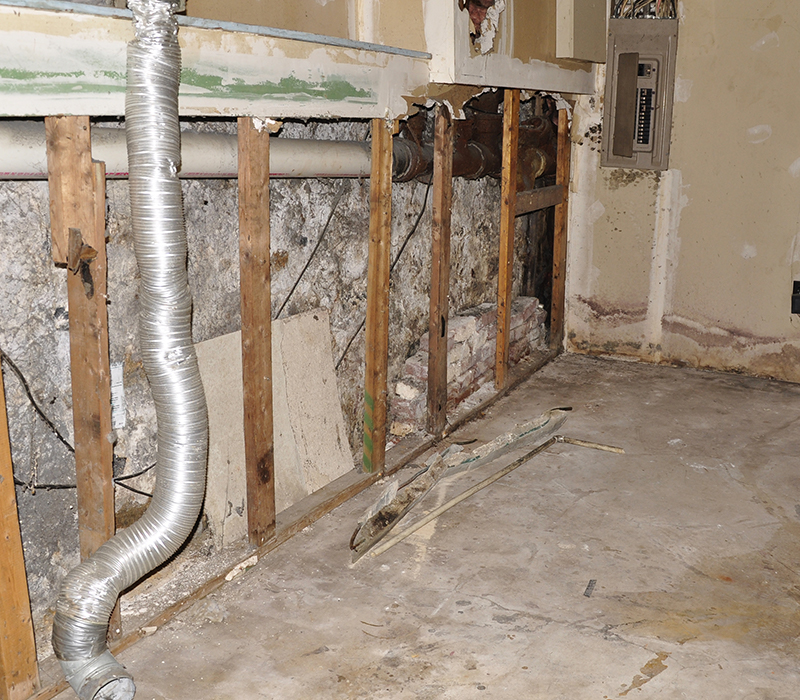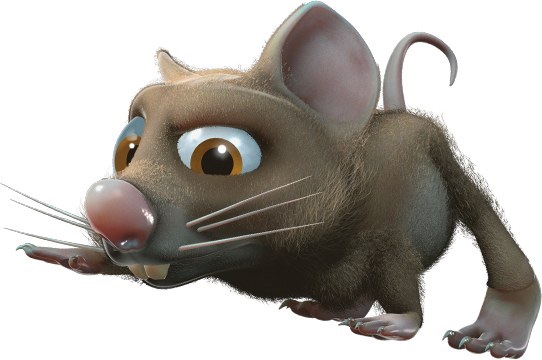Protect Your Home from Mouse Infestations
Mice and other nuisance wildlife will sneak into your home and can wreak havoc before you even know it. While in your home, mice will build nests, tear out insulation, and leave their droppings anywhere and everywhere. It is common to find chewed insulation, wiring, cardboard, even books.
Mouse droppings can not only damage the insulation, it can cause diseases and trigger allergic reactions. Diseases spread by mice are also cause for concern. With this in mind, it’s imperative to eliminate the mouse infestation, clean the impacted area(s) thoroughly, and prevent future infestations.
Our mouse control program ensures the three phases of rodent control are properly tackled — removal, cleanup, and exclusion — to stop current rodent problems and prevent any future ones.

Mouse Removal
We locate the source of the mouse infestation, such as points of entry and food sources, and work to repair any damage caused by mice.

Mouse Clean Up
Once all mice are removed, we will remove all equipment and clean up any droppings, urine, or other messes made by the invaders.

Mouse Exclusion
Catseye’s Cat-Guard Exclusion Systems are a permanent mouse exclusion feature that protects homes from mice.


Mice Removal Service For Homes
The Catseye mission is to protect your home by providing the best mouse control program and award-winning customer service. We are experts at carpenter ant elimination through a time-tested process that includes:
- Platinum Home Protection Money-Back Guarantee
- Free Inspection of Your Home
- Customized Treatment Plan
- Comprehensive, In-Depth Service Visits
- Flexible Scheduling & Emergency Visits
- Secure Online Account & Dedicated Customer Service Representative
- Catseye’s Signature Service Scan System & Reporting
Repairing Damage Caused by Mice
Rodents will sneak into your basements, attics, and any crawl spaces they can find. They build nests in attics, tear out insulation, and leave their droppings anywhere and everywhere.
Catseye will make your basement, attic, and even those crawl spaces dry and clean so that you won’t feel uneasy about using them . For the process of fixing the damage caused by rodents, we offer the following services:


Keep Mice Out Permanently
When dealing with a rodent problem, rodent and mice exclusion is the only way to ensure that the problem never returns.
Catseye’s Cat-Guard Exclusion Systems are a permanent rodent exclusion feature that protects homes and other structures from being taken over by rodents.
To do so, our pest and nuisance wildlife technicians utilize long-term solutions like full home seal-ups.
Frequently Asked Questions
How can I tell if I have mice?
There’s a good chance that you have a mice or rat problem if you hear noises like scratching, squeaking, and scampering.
There are some differences to look for when figuring out if you have a mouse or rat problem.
Since rats are larger than mice, you will find bigger droppings left behind by these rodents. Rats tend to favor meat and grains.
Mice, on the other hand, will be attracted to plants and grains. They will also leave behind smaller, pellet-shaped droppings.
Both mice and rats hide in walls, ceilings, floors, or attics and leave brown droppings near food.
You may also notice a greasy path of dirt and oil along the baseboards from mice or rats following the same route when searching for food.
Chewed paper or cloth are often found in boxes, drawers, basements, or attics. A musty odor may also be present.
What diseases do mice carry?
Rodent populations grow quickly and the presence of rodents in your home can cause several problems.
The parasites that rodents carry with them can cause diseases like hantavirus, leptospirosis, lymphocytic choriomeningitis (LCMV), Tularemia and Salmonella through direct and indirect contact.
These diseases can be harmful to humans, especially young children and older individuals with weak immune systems.
Viruses like the Hantavirus Pulmonary Syndrome are spread through direct contact with rodents. But, it can also be spread by their droppings, their urine, or inhaling dust that contains dropping particles.
The shedding of hair by rodents can also spread dangerous pathogens through a home’s vents and onto your furniture.



